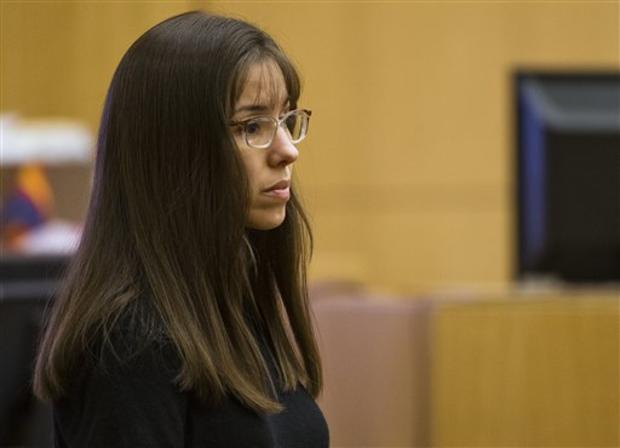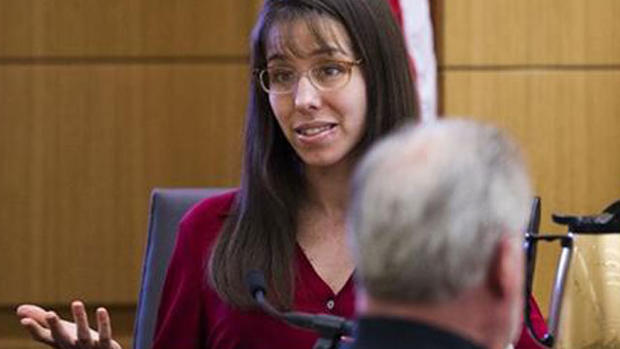Jodi Arias Trial: Woman charged in ex-boyfriend's murder suffered from PTSD, memory loss, expert testifies
(CBS/AP) PHOENIX - Jodi Arias suffered from post-traumatic stress disorder and acute memory loss in the months and years after she says she killed her lover in self-defense. This is a common occurrence after highly stressful events, a defense expert testified Thursday in her Arizona death penalty trial.
PICTURES: Jodi Arias murder trial
Arias is charged with first-degree murder in the June 2008 death of Travis Alexander in his suburban Phoenix home. Authorities say she planned the attack in a jealous rage. Arias initially told authorities she had nothing to do with the killing, then blamed it on masked intruders. Two years after her arrest, she settled on self-defense.
WATCH: Picture Perfect: The trial of Jodi Arias
WATCH: Jodi Arias: "I was scared for my life"
Trial is scheduled to resume Monday.
Arias testified for 18 days over nearly six weeks during which she described her abusive childhood, cheating boyfriends, dead-end jobs, a shocking sexual relationship with Alexander, and her contention that he had grown physically abusive in the months leading to his death, once even choking her into unconsciousness.
She says she recalls little from the day of the attack.
"A large percentage of individuals who are in such settings do not remember or have cloudy or foggy memories of what has transpired," psychologist Richard Samuels told jurors Thursday. "We are more concerned with survival."
Samuels is an Arizona-based expert whose website says he specializes in "sexually violent perpetrator evaluations, psychosexual risk assessments, sexual harassment and gender discrimination matters."
He said he met with Arias a dozen times over the past three years and that he eventually diagnosed her with PTSD.
Samuels explained how when a person finds themselves in a stressful situation, "the body prepares to fend off harm, to protect itself," releasing hormones and adrenaline that block the brain's ability to retain memory.
"It can't be controlled. It's part of our built-in protective system," he said, adding that up to 30 percent of defendants convicted in homicide cases claim to have amnesia at their trial.
"There are many people that never remember the actual events," Samuels said.
Alexander suffered nearly 30 knife wounds, was shot in the head and had his throat slit before Arias dragged his body into his shower.
Arias has said she recalls Alexander attacking her in a fury. She says she ran into his closet to retrieve a gun he kept on a shelf and fired in self-defense but has no memory of stabbing him repeatedly.
Arias' grandparents had reported a .25-caliber handgun stolen from their Northern California home about a week before Alexander's death -- the same caliber used to shoot him -- but Arias says she didn't take it. Authorities believe she brought it with her.
She has acknowledged trying to clean the scene of the killing, dumping the gun in the desert and leaving the victim a voicemail on his cellphone hours later in an attempt to avoid suspicion. She says she was too scared and ashamed to tell the truth.
Since the trial began, none of Arias' allegations of Alexander's violence, that he owned a gun and had sexual desires for young boys has been corroborated by witnesses or evidence. She has acknowledged lying repeatedly but insists she is telling the truth now.
Judge Sherry Stephens allowed Samuels to testify Thursday over objections from the prosecution, but only about the brain's process of memory retention and PTSD. Stephens set a hearing for Friday morning to hear arguments from attorneys before deciding if she would allow Samuels to discuss whether the killing appeared to be premeditated based on his review of crime scene photos and interviews with Arias.
Samuels also testified Thursday that based on a review of Arias' journals dating back to her teenage years that she is "essentially a pacifist."
He said she lied initially about her involvement in the killing because she was in denial, "where a person cannot deal with the fact that something they did is so opposite from everything else in their life."
Complete coverage of Jodi Arias on Crimesider

